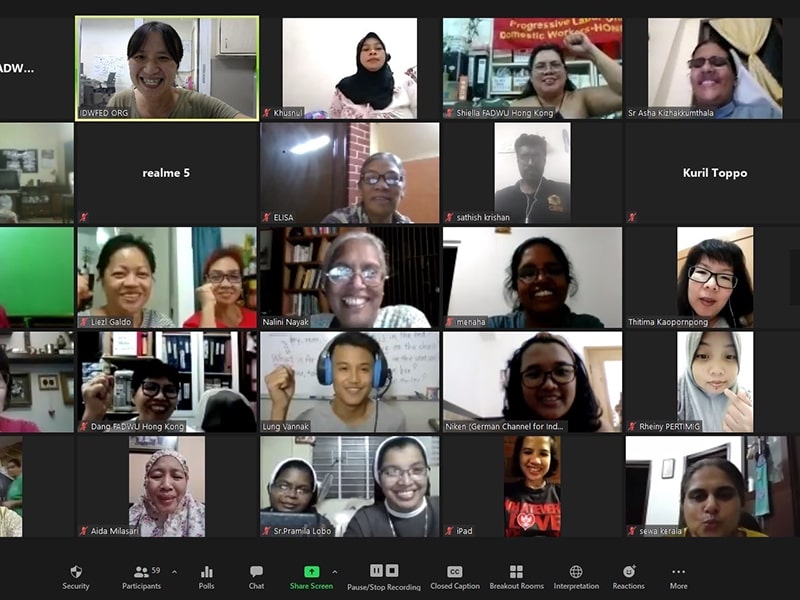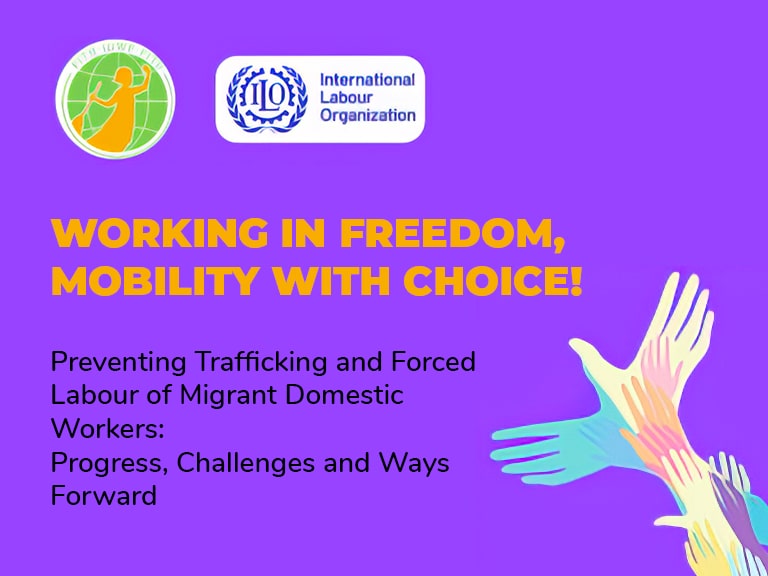- This event has passed.
Alternative livelihood for domestic workers under COVID-19 economic crisis: Learning from the best practices in Asia
We foresee a long journey toward the crisis recovery and full legal protection of domestic workers. We see the need for an alternative economic and livelihood initiatives that can secure domestic workers’ income and livelihood so that they are resilient in time of crisis.
Details
The Covid-19 crisis brings a great impact on the lives of millions of marginalized people in Asia, and domestic workers are among the hardest hit by the crisis. IDWF affiliates in Asia have reported that members are suffering from job loss and access to livelihoods during COVID-19 lockdowns until now. These impacts are heightened by the lack of safety net and social security because the majority of them are in the informal sector and they are excluded from legal protection.
We foresee a long journey toward the crisis recovery and full legal protection of domestic workers. We see the need for an alternative economic and livelihood initiatives that can secure domestic workers’ income and livelihood so that they are resilient in time of crisis. On Sunday, 16th August 2020, IDWF Asia held a sharing and discussion on this specific topic. The discussion was done online via zoom, involving around 75 participants from 13 affiliates in 10 countries, with 5 language interpretations. Among them, Elizabeth Tang, the General Secretary, Novelita Palisoc and Gyanu Kshetri, members of our Executive Committee were present. We learned from the experiences of IDWF affiliates in Hong Kong – FADWU who presented about the Asian Migrants Credit Union (AMCU), the Food Bank Program by the Domestic Workers Union in Sri Lanka, and the Homecare Cooperative under the Cooperative Federation of SEWA in India. The panel was facilitated by Fish Ip, the Asia Regional Coordinator.
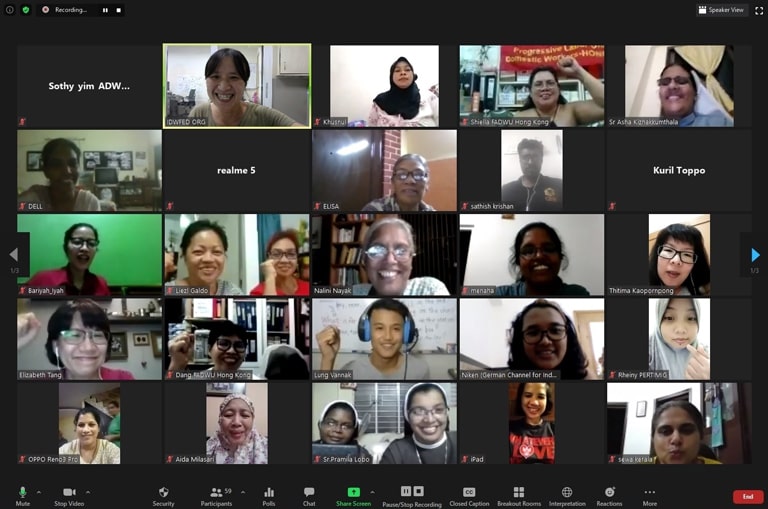
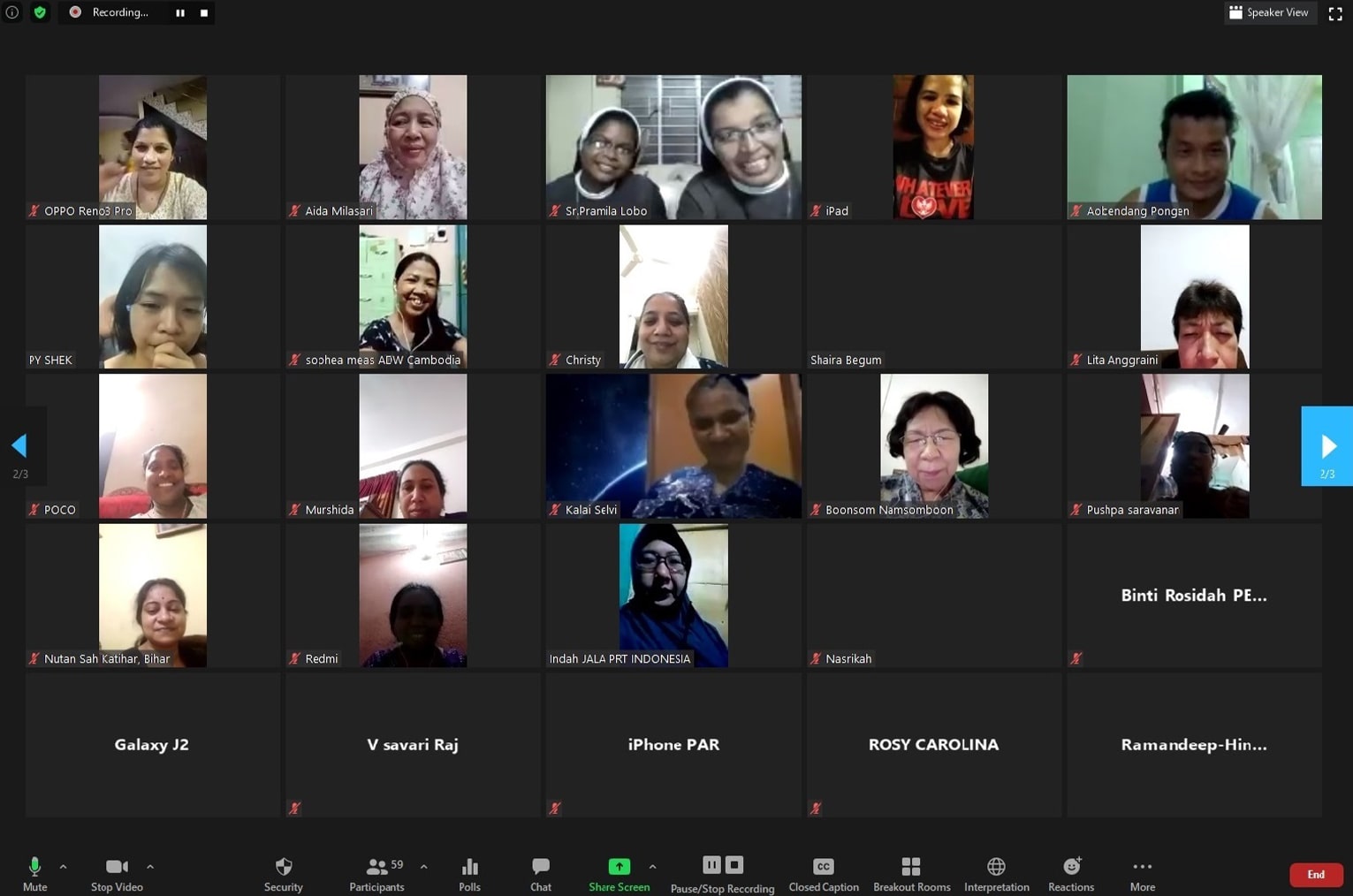
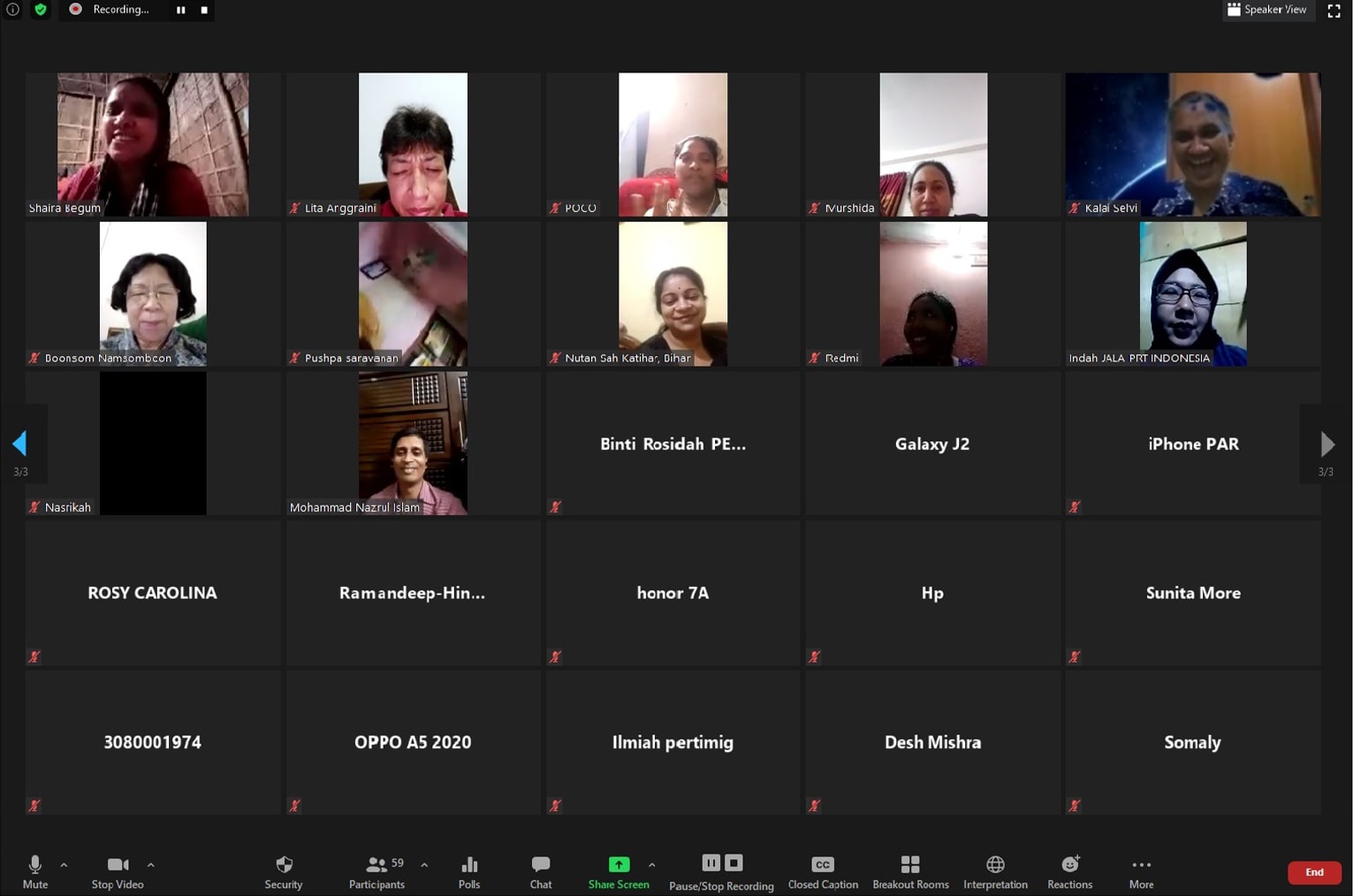
Hong Kong
On the sharing on migrant’s credit cooperative, Shiella Estrada – EXCO members of FADWU highlighted the importance of savings among migrants in the destination countries. Migrant domestic workers in Hong Kong are the lowest earner in the city, yet they send most of their salary back home. Only 6% of them have savings on their own, and many are drowned in debts from financial agencies with loans on high-interest rates. During the COVID-19 crisis, many migrant domestic workers in Hong Kong get terminated. They do not have enough savings to live during contract transitions. AMCU encourages both union and non-union members to save in their co-op. Saving is crucial for migrant domestic workers’ retirement, especially because they are excluded from the city’s pension scheme. The Co-op provides dividends based on their savings. When the workers are in need of money, they can request loans from the co-op with only a 1% interest per month. They also provide education on financial management for their members and promotes a transparent and democratic system in their management. AMCU is the first and only credit union in Hong Kong whose members are migrants. Now they have grown their memberships and capital, where many of the members do not only borrow money but also invest in high savings.
Sri Lanka
In Sri Lanka, the domestic workers union created the Food Bank Program as a strategy to organize domestic workers during the pandemic. Leaders and members were fully involved in the planning and implementation of the activity. They stocked the food (rice, vegetables, flour, daal, etc.) by linking the local farmers with their program. They would stand by at the union office in Kandy Province every day from 9-5 pm for the members in need. During the pandemic, many domestic workers in Sri Lanka reported the loss of jobs and had a decrease in income; most of them did not have access to social security. Many were also trapped in domestic violence and were in dire need of social support.
“Our program is a way to show that the union is there with the members. And it is important to show solidarity in times of crisis,” said Menaha Kandasamy – the advisor of Sri Lanka Domestic Workers Union.
In two months, the Food Bank program was able to distribute food and plants to 400 domestic workers and their families. Domestic workers who came to the union office were also given information on COVID-19 and provided with a platform to discuss their problems. This program has successfully strengthened the union organizing by motivating the existing members to be more active in the union activities and expand their new membership.
India

The last sharing came from SEWA India and its Homecare Cooperative run and owned by domestic workers. As a trade union of 1.8 million women workers in the informal sector, SEWA applies a unique approach in their movement. They combined a joint strategy of union organizing and cooperative movement under the SEWA Cooperative Federation. While the union organizes workers to fight for their rights and unity, the cooperative federation supports women’s collectives and enterprises to provide a sustainable livelihood option for their members, family, and community. SEWA Cooperatives Federation runs in multi-different sectors, including agriculture, services, social security, finance, and vending since 1992. Currently, the Federation has organized around 300,000 women into 106 primary cooperatives. Their motto is that workers should take ownership of their labour and trade.
SEWA Homecare is a domestic workers’ cooperative based in Ahmedabad which is fully run and owned by 200 domestic workers. Its objective is to provide livelihood opportunities in the service sector, improving the skill of the members, make the workers have a role and decision making on their works. SEWA Homecare provides services that ranged from housekeeping, cooking up to childcare, elderly care, and patient care. By laying down a foundation that domestic workers are workers, the cooperative provided a contract that ensures a better salary and working condition. This way, they also helped to raise awareness of the employers and customers. SEWA Homecare aims to improve skill training for their members continuously, thus they can deliver high-quality services for employers and customers and sustain their business.
During the pandemic, there were fewer jobs due to lockdown, and some employers were unwilling to pay for the salary. This is where the cooperative helped the members to get their salary, and some of them can get it. For many domestic workers who are unable to come to work due to lockdowns, the Cooperative Federation gave works of sewing masks for those who have the machines. By networking with the cooperatives from the other sectors, they are currently exploring an alternative for livelihood restoration in some more robust sectors, such as hospital and office cleaning, and city sanitation. Some of their members were also able to benefit from the SEWA low-cost insurance products which can cover their wage lost and healthcare.
“Under the COVID-19 crisis, the need to collectivize domestic workers to sustain their livelihoods is becoming more prevalent because they have been scrapped from the labour law,” said Salonie of SEWA India.
This sharing session made participants very engaged in an interactive discussion. Some questions were thrown regarding how the unions can make the start-up and manage the cooperatives. Speakers responded that their unions initially make use of a grant and donation as a start-up but now they have become self-sustained including the IDWF Solidarity Fund. While some co-ops are being managed voluntary by the union leaders, some have already enough resources to hire a professional to take responsibility in the management.
The three livelihood programs showed how domestic workers unions can play an important role in addressing their members’ needs in times of crisis. IDWF affiliates can learn from these practices and create their own initiatives based on their country specific contexts and members’ needs. Elizabeth Tang, the General Secretary of IDWF appreciated the remarkable initiatives by IDWF affiliates and highlighted “as trade unions, we need to put organizing at the back of our minds, even when these initiatives are meant to support our members’ livelihoods.”
